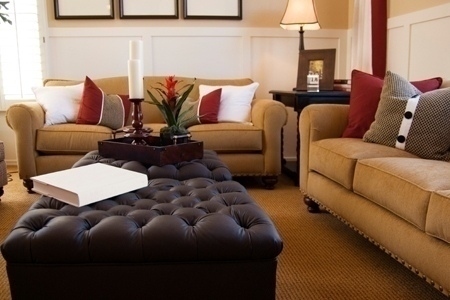 Most homeowners know it is important to keep a home clean, bright and free from clutter while it is on the market for sale. But sometimes,REALTORS® say, taking the extra step to stage a home can make a difference in how a buyer values it and the price a seller might get for it, according to the National Association of REALTORS® 2015 Profile of Home Staging.
Most homeowners know it is important to keep a home clean, bright and free from clutter while it is on the market for sale. But sometimes,REALTORS® say, taking the extra step to stage a home can make a difference in how a buyer values it and the price a seller might get for it, according to the National Association of REALTORS® 2015 Profile of Home Staging.
“REALTORS® know how important it is to have a home in the best shape possible when showing it to prospective buyers,” says NAR President Chris Polychron. “At a minimum, homeowners should conduct a thorough cleaning, haul out clutter, make sure the home is well-lit and fix any major aesthetic issues. Another option is staging a home, which REALTORS® often suggest to sellers to help prospective buyers better visualize themselves in the home and could modestly increase the home’s value for both the buyer and seller.”
The report, the first of its kind from NAR, found that 49 percent of surveyed REALTORS® who work with buyers believe staging usually has an effect on the buyer’s view of the home. Another 47 percent believe that staging only sometimes has an impact on a buyer’s view of the home only. Only 4 percent of Realtors® says staging has no impact on buyer perceptions.
REALTORS® on the buyer side believe that staging makes an impact in several ways; 81 percent says staging helps buyers visualize the property as a future home, while 46 percent says it makes prospective buyers more willing to walk through a home they saw online. Forty-five percent says a home decorated to a buyer’s tastes positively impacts its value; however, 10 percent of REALTORS® say a home decorated against a buyer’s tastes could negatively impact the home’s value.
From the seller side, a majority of REALTORS® utilize staging as a tool in at least some instances. Just over a third of REALTORS® (34 percent) utilize staging on all homes, while 13 percent tend to stage only those homes difficult to sell, and another 4 percent will do so only for higher priced homes. The median cost spent on staging a home is $675. Sixty-two percent of REALTORS® representing sellers say they offer home staging service to sellers, while 39 percent say the seller pays before listing the home.
REALTORS® representing both the buyer and seller agreed on two major points in the report—which rooms should be staged and the change in dollar value a buyer is willing to offer for a staged home compared to a similar not-staged home. Realtors®ranked the living room as the number one room to stage, followed by a kitchen. Rounding out the top five rooms were the master bedroom, dining room and the bathroom.
REALTORS® believe that staging increases a buyer’s perceived value of a home from 1 to 5 percent (according to 37 percent of REALTORS® representing sellers and 32 percent of REALTORS® representing buyers). The increase in value is closer to 6 to 10 percent says 22 percent of REALTORS® representing sellers and 16 percent of REALTORS® representing buyers.
“Working with a REALTOR® gives buyers, sellers and investors the advantage they need to succeed in today’s market, as they know what buyers want and how to best market and stage a home for sale,” Polychron says. “While many factors play into what a home is worth and what buyers are willing to pay for it, staging is an excellent tool that can be used to give a home a little extra push for sellers. Staging isn’t used by every REALTORS® in every situation, but the impact it may have and the value it can bring is clear to both home buyers and sellers.”
For more information, visit www.realtor.org.











